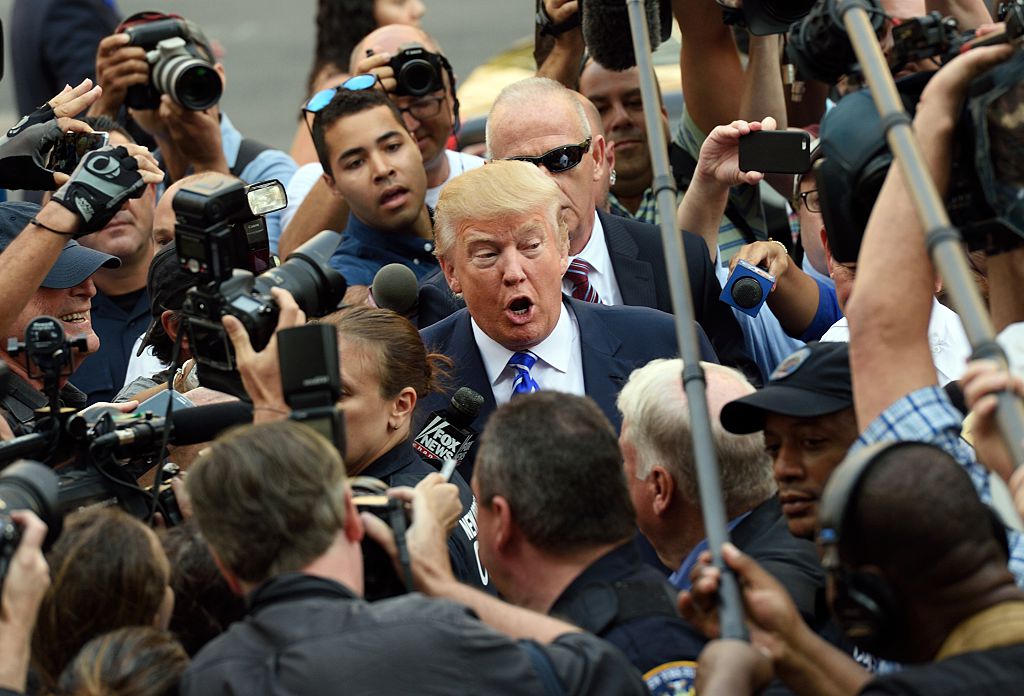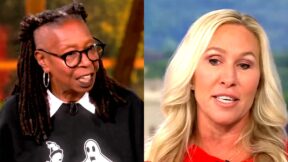A Dissent: President Trump is the Most Influential in Media and It’s Not Even Close

Don Emmert/Getty Images
Every year the editorial staff at Mediaite enjoys a spirited discussion about the power of influence in the political news media, and those discussions are honed, chiseled and eventually immortalized in Mediaite’s Most Influential in News Media list. It’s a wildly entertaining conversation that takes into account variables like ratings, circulation, editorial independence and, of course, the year’s best scoops and stories that drove the news cycle.
The first criteria of who gets included in this list of newsmakers is, of course, that they have to be a member of the media. But we have to recognize that rule excludes the single most influential individual in today’s media landscape: President Donald Trump.
This is not a comment on the policies or political rhetoric of the commander-in-chief who, depending on where you stand, has either created or been a victim of a remarkably divided American body politic.
Trump’s uncanny ability to drive cable news programming conversations through on background interviews with reporters, his massive and closely watched Twitter feed, impromptu press sprays on the White House lawn and calls in to Fox News mean the president’s power is wielded more like a cable news executive producer or news outlet editor in chief.
One can make the argument that the leader of the Executive Branch should be far more focused on, say, running the executive branch than driving cable news narratives. But in the age of information wars and the sudden mainstreaming of the ephemeral nature of meaning, Trump’s devil-may-care-attitude of virtually saying or doing anything to create a distraction and affect on-air discussion has been surprisingly effective for an embattled White House.
Simply put, Trump’s presidency is one part policy, one part all-out media assault which has, thus far, been a recipe for success and stature as the most famous person in the world.
One need only look at Trump’s Sunday tweet that mocked the appearance of Speaker Nancy Pelosi in a manner that wasn’t just unpresidential, it also flouted any basic decorum or basic social contract of behavior, to see how his decisions, witting or unwitting, decide what dominates the conversation on TV and online.
A round of condemnations and copious coverage ensued, as Trump and allies will always offer defense and offense in such fights, arguing he is fighting fire with fire over insults or attacks from the left, and on it goes. But that debate itself is a distraction from the ongoing impeachment proceedings.
That Fox News poll that showed 50% of Americans are still in favor of impeachment and removal from office? Well, that story got less coverage, too, as a result of Trump’s attack on Pelosi.
The art of political distraction is nothing new, but that’s not the sum of what Trump is doing. It’s not merely changing the channel or the topic, the president is actively — and constantly — creating news cycles for his own ends. Even when the stories are negative, or the coverage is a net negative, it’s still his doing.
Consider the current impeachment over Ukraine. The scandal has been entirely borne from Trump’s efforts to distract the press with a Biden investigation. In doing so, Trump and sidekick Rudy Giuliani unwittingly pushed House Democrats toward impeachment. While it sounds like a blunder, how many times has he and his supporters insisted they an impeachment that will backfire on Democrats in 2020?
Like any dysfunctional relationship, it takes two to tango. And Trump’s art of distraction is willingly enabled by a political media landscape that has treated every new shiny object as a bombshell or breaking news item. (Yes, Mediaite is fully part of that dynamic.) Worth noting that while Trump has treated many in the press as the “enemy of the people” the very same media industry is recording record profits, largely as a result of Trump’s world-class ability to draw eyeballs. Are we not entertained?
The debate about impeachment itself is evidence of Trump’s carnival barker media mastery. There are two distinct conversations surrounding these historic proceedings: Democrats are focused on alleged wrongdoing of asking a foreign power to investigate a domestic political rival, while Trump and his base of allies are focusing on the politics surrounding the act of impeachment itself. It’s a debate in which two sides conveniently talk past one another in a manner that protects Trump from any criticism from his allies. And so it goes.
Trump was elected as an outsider. A disruptor. His supporters largely knew him as a best-selling author who crowed about banal deal-making arts and a competitive reality show focused on firing the weakest business mind. But as anyone who is familiar with reality show production knows, what one sees in the final product is far from reality, it’s highly produced smoke and mirrors.
While Trump had forever been a master of public relations and marketing, the regular broadcast television experience only made Trump a sharper and more confident media figure. And in an age in which media narratives seem far more important than policy, is it any wonder that the most powerful individual in the free world comes entirely from success in the media world?
There is an old adage that the people get the government they deserve. And an American public so obsessed with screen time, social media an “amusing ourselves to death,” it come as no surprise that the president of the United States is a media savant, whose messy legend was forged in 1980s New York tabloids, revived in 2000s reality television and catapulted to the White House in 2016 by a cable news network.
No President Trump is not directly a member of the media, but there is no one who takes better advantage of the inherent bias for conflict that he is so genius at manipulating, for better or worse.
In 2019, there is little doubt who the most influential in media is: President Donald Trump.




